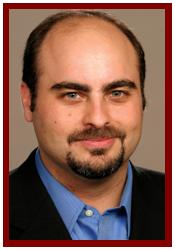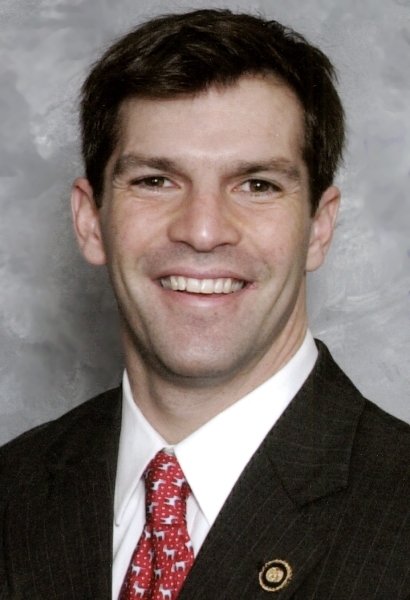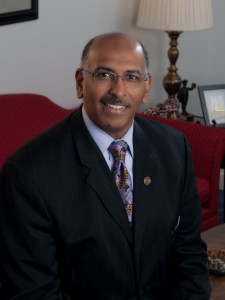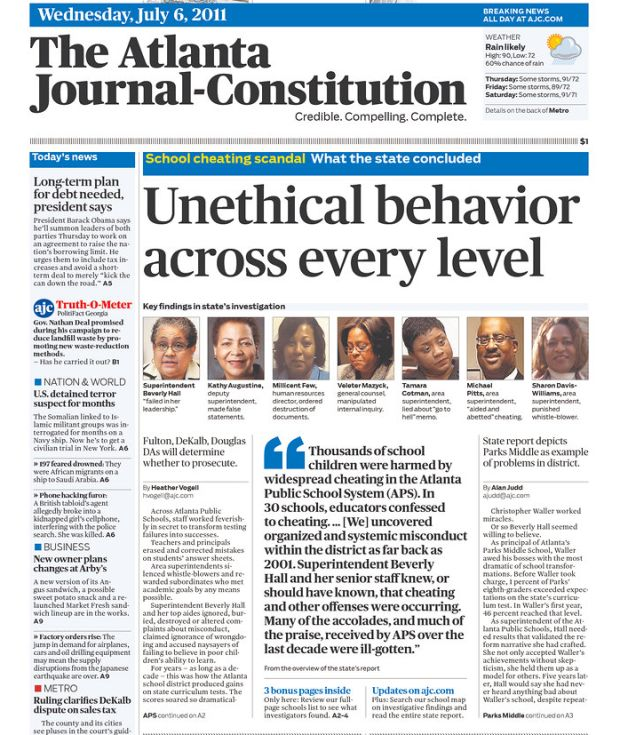By RP Staff, on Fri Dec 9, 2011 at 8:30 AM ET Contributing RP Eva Moskowitz, a former New York City Councilwoman, has announced plans to expand her nationally-recognized charter school network into Brooklyn:
Ms. Moskowitz’s push into well-heeled neighborhoods comes at a critical time for her nine-school Success Charter Network, which she launched in Harlem in 2006 and expects to grow to 40 schools across the city in the next few years. Charter school supporter Michael Bloomberg has two years left as mayor, and his successor might not be as eager to provide the city-owned space that new schools often need.
Charters have been elbowing their way into the city landscape since the 1990s by offering an education lifeline to high-poverty areas desperate for quality schools. Now, Ms. Moskowitz, whose abrasive style has made her a lightning rod for charter opponents, is pitching her schools to lawyers, doctors and other professionals.
It’s a fundamental shift for Ms. Moskowitz and the charter school movement. While she has braved five years of slings and arrows, her network’s future—and that of other charter schools—may hinge on their ability to build constituencies in affluent, influential areas.
“The political significance of this cannot be ignored,” said Steven Brill, whose book Class Warfare chronicles the school reform battles raging across the country. “Once you have charter schools flourishing in middle-class neighborhoods, they become impossible to oppose.”
Ms. Moskowitz gives an educational, rather than political, rationale. “We’ve got to have more, not fewer, alternatives to a profoundly broken education system,” she said. “The clock is ticking against our kids.”
Click here to read the full story from Crain’s New York Business.
By Ronald J. Granieri, on Mon Nov 21, 2011 at 8:30 AM ET  In 1963, William F. Buckley, Jr. quipped “I would rather be governed by the first 2000 names in the Boston phone book than the faculty of Harvard University.” The quote has been passed around so often in various forms (my initial Google search this morning returned more than seventy million hits), with and without attribution to the late Mr. Buckley, that the original context of the comment (a jab at the Kennedy brain trust) is lost in the mist. In 1963, William F. Buckley, Jr. quipped “I would rather be governed by the first 2000 names in the Boston phone book than the faculty of Harvard University.” The quote has been passed around so often in various forms (my initial Google search this morning returned more than seventy million hits), with and without attribution to the late Mr. Buckley, that the original context of the comment (a jab at the Kennedy brain trust) is lost in the mist.
At the risk of alienating many of my readers, I will declare right now that Buckley has been one of my heroes since my teenage years. However my opinions on specific issues may have diverged from his over time, Buckley’s sparkling wit and clarity of thought continue to inspire me. I still read his works for pleasure, and measure my own poor writing style against his.
 Even the cleverest comments from great thinkers, however, can be dangerous when they are wrenched from their original context and take on a life of their own. (Thomas Jefferson, the tree of liberty, and the blood of tyrants come to mind…) Buckley’s Boston phone book quote is just such a comment. It has become a popular rhetorical tic among conservatives, and threatens to be more damaging to the conservative intellectual project than anything ever dreamt up on the left. Even the cleverest comments from great thinkers, however, can be dangerous when they are wrenched from their original context and take on a life of their own. (Thomas Jefferson, the tree of liberty, and the blood of tyrants come to mind…) Buckley’s Boston phone book quote is just such a comment. It has become a popular rhetorical tic among conservatives, and threatens to be more damaging to the conservative intellectual project than anything ever dreamt up on the left.
The quote, and the attitude behind it, has been in a great deal of conscious and unconscious circulation of late, as Republican presidential candidates attempt to contrast themselves with President Obama and to deal with their own occasional lapses of knowledge or eloquence. Thus we have Rick Perry, fresh off recent debate catastrophes, saying to all who would listen, “I am a doer, not a talker. ” Similarly, Herman Cain, far from embarrassed about his lack of facility in discussing complicated international events, has embraced ignorance, proclaiming (in unconscious echo of a classic moment from The Simpsons): “We need a leader, not a reader.” In this time of crisis, these messages suggest, the country should reject intellectual attainment in favor of someone unfettered by too much thinking.
Read the rest of…
Ronald J. Granieri: Up From Ignorance
By Jonathan Miller, on Thu Nov 10, 2011 at 11:30 AM ET
By RP Staff, on Wed Oct 26, 2011 at 12:00 PM ET While the “Occupy Wall Street” movement gains some steam, some critics are pointing to some of the philanthropy taking place among the masters of the universe. In the following article, Newsweek profiles the work contributing RP Eva Moskowitz is doing to improve education for poor, urban youth in New York City and her support on Wall Street:
It was a scene to curdle liberal blood. A ballroom full of New York hedge-fund managers playing poker … to raise money for charter schools.
That’s where I found myself last Wednesday: at a Texas Hold ’Em tournament to raise money for the Success Charter Network, which currently runs nine schools in some of New York’s poorest neighborhoods.
While Naomi Wolf was being arrested for showing solidarity with the Occupy Wall Street movement, there I was, consorting with the 1 percent the protesters hate. It’s no surprise that the bread-heads enjoy gambling. But to see them using their ill-gotten gains to subvert this nation’s great system of public education! I was shocked, shocked…
Your ZIP code can be your destiny, because poor neighborhoods tend to have bad schools, and bad schools perpetuate poverty. But the answer is not to increase spending on this failed system—nor to expand it at the kindergarten level, as proposed by Nicholas Kristof in The New York Times last week. As brave reformers like Eva Moskowitz know, the stranglehold exerted by the teachers’ unions makes it almost impossible to raise the quality of education in subprime public schools.
The right answer is to promote the kind of diversity and competition that already make the American university system the world’s best. And one highly effective way of doing this is by setting up more charter schools—publicly funded but independently run and union-free. The performance of the Success Charter Network speaks for itself. In New York City’s public schools, 60 percent of third, fourth, and fifth graders passed their math exams last year. The figure at Harlem Success was 94 percent.
By Jeff Smith, on Mon Sep 19, 2011 at 12:00 PM ET  I know academics. I’ve worked with academics. And Elizabeth Warren is no typical academic. She’s grounded where many academics are theoretically-oriented, direct where most academics are wordy and circuitous, unpretentious where many academics are impressed with themselves and their own pedigree. I know academics. I’ve worked with academics. And Elizabeth Warren is no typical academic. She’s grounded where many academics are theoretically-oriented, direct where most academics are wordy and circuitous, unpretentious where many academics are impressed with themselves and their own pedigree.
Scott Brown is clearly charismatic and formidable. But Warren’s no Coakley, too good to shake hands with the common folk. She’s a gritty working-class girl made good. And having lived through Coakley she has a playbook of what not to do.
I think that the toughness, candor, and populist passion that turned off some D.C. elites will play quite well with independent Massachusetts voters. It will be a great race to watch. some D.C. elites will play quite well with independent Massachusetts voters. It will be a great race to watch.
(Cross-posted, with permission of the author, from Politico’s Arena)
By Michael Steele, on Mon Sep 19, 2011 at 8:30 AM ET
 Racial and economic profiling in education endangers black students’ success. Why put up with it? Racial and economic profiling in education endangers black students’ success. Why put up with it?
Fifty-seven years ago, the U.S. Supreme Court ruled that the standard of “separate but equal” in our education system was one that is fundamentally unequal — and, moreover, is un-American, unconstitutional and immoral.
In the nearly 60 years since the Brown v. Board of Education Supreme Court decision, we have seen incredible progress. But we have also witnessed a steady decline in the performance and self-esteem of our children as they grapple with a cumbersome and often myopic educational system.
Sadly, far too many students entering classrooms this fall have already been taken hostage by the politics of the moment and a zero-sum mentality in education that serves no purpose. The truth is, there remain inherent disparities in our education system that have eaten away at the very spirit of the Brown decision.
For too long, federal and state bureaucrats have talked about what they want to do for education without an appreciation for what they have already done to education: made it harder to bring our education system into the 21st century.
In my 2005 report on the state of education in Maryland during my term as lieutenant governor, I noted, “The most important work of a free society, other than defending its very existence, is the education of its population. For Maryland to be serious about preparing all of its children to succeed in tomorrow’s America, it must provide for consistent, high quality instruction and stable, effective leadership in all of its schools.
“In the fast-changing world that future generations will inhabit, the highest quality education can no longer be viewed as a privilege of the few. It must be the norm for every child. Any other course of action will doom our future generations in Maryland and our nation to a second-class status.”
Legislation Alone Doesn’t Work
Such clarion calls for reforms and the creation of realistic standards have largely been met with a mixed response from educational professionals and parents. From Maryland to California, we’ve applauded every form of experimental methodology there is, but somehow we’ve forgotten how to do the basics.
 As Dr. John Jackson, president of the Schott Foundation for Public Education, recently noted, “We cannot become so affixed on the spotlights that we constructively ignore the larger headlights from the train wreck facing our country by the 1.2 million [American students] we are losing each year [as they drop out of school]. We have too often settled for the sweet taste of minor success over stomaching the bitter taste of the reality that without systemic reform we are winning some battles, but largely still losing the war.” As Dr. John Jackson, president of the Schott Foundation for Public Education, recently noted, “We cannot become so affixed on the spotlights that we constructively ignore the larger headlights from the train wreck facing our country by the 1.2 million [American students] we are losing each year [as they drop out of school]. We have too often settled for the sweet taste of minor success over stomaching the bitter taste of the reality that without systemic reform we are winning some battles, but largely still losing the war.”
Read the rest of…
Michael Steele: Learning While Black
By Ronald J. Granieri, on Wed Aug 31, 2011 at 8:30 AM ET  The media are full these days of stories discussing the relative value of education. Some detail the political fights in various states, such as Texas and California, over funding and control of state universities, while others discuss the failure of universities in general to educate “academically adrift” students, or the pernicious effects of the tenure system on higher education. Central to many of these discussions are attempts to evaluate education, or individual educators, on the basis of measurable quantities—student scores on standardized tests or average salaries upon graduation on the one hand, number of refereed publications or hours taught on the other. The media are full these days of stories discussing the relative value of education. Some detail the political fights in various states, such as Texas and California, over funding and control of state universities, while others discuss the failure of universities in general to educate “academically adrift” students, or the pernicious effects of the tenure system on higher education. Central to many of these discussions are attempts to evaluate education, or individual educators, on the basis of measurable quantities—student scores on standardized tests or average salaries upon graduation on the one hand, number of refereed publications or hours taught on the other.
Frankly, I find these discussions both depressing and unenlightening. Attempts to quantify the value of an education strike me as irrelevant at best and pernicious at worst.
 Part of my objection is practical. Any quantitative measure of education is susceptible to interpretation and manipulation (literally, if one follows the growing scandal in the Atlanta public schools over cheating on standardized tests). Even if honestly gathered, such data may still not tell us what we think we want to know. Do the GPAs or the starting salaries of graduates really tell us whether those graduates received good educations, or do they just tell us about the relative success of those graduates to manage the practical aspects of life? Should we be surprised that Engineering majors make more on average than English majors? Do the number of refereed publications or the numbers of credit hours taught tell us whether a professor is an effective educator? Part of my objection is practical. Any quantitative measure of education is susceptible to interpretation and manipulation (literally, if one follows the growing scandal in the Atlanta public schools over cheating on standardized tests). Even if honestly gathered, such data may still not tell us what we think we want to know. Do the GPAs or the starting salaries of graduates really tell us whether those graduates received good educations, or do they just tell us about the relative success of those graduates to manage the practical aspects of life? Should we be surprised that Engineering majors make more on average than English majors? Do the number of refereed publications or the numbers of credit hours taught tell us whether a professor is an effective educator?
Read the rest of…
Ron Granieri: On the Tyranny of the Measurable
By Kristen Hamilton, RP Staff, on Fri Aug 19, 2011 at 2:00 PM ET Still high off studying abroad in Paris, I decided to compile a list of my most enjoyable moments in Paris. This list is in no particular order, because to be quite honest, it is a bit difficult to choose between indulging in the luxury of Chanel and nearly getting attacked on the Metro. See what I mean? Check out my top 5 below:
1. Praying in the Sacré-Coeur
Regardless of the trek that it took to finally reach Sacré-Coeur, it was completely worth it. Unlike Notre Dame, I actually had the chance to go into this church (it was free) and sit down in the sanctuary. A lot of people sat down to hopefully put an end to their incessant sweating (myself, included); however, while sitting down, I was moved to pray. Tears rolled down my eyes out of nowhere; this experience was moving, to say the least. I actually had the opportunity to visit Sacré-Coeur twice, and I can honestly say that I will forever cherish the memories that I made there. Okay, enough of the crying – now to the fun stuff.
2. Visiting Notre Dame AND then watching Disney’s Hunchback of Notre Dame
Another church? I know, but I actually didn’t go into this one, and I don’t know what excited me more: seeing Notre Dame in person or seeing Notre Dame in person AND then running back to my room to watch the Disney classic featuring the beloved Quasimodo. The Hunchback of Notre Dame was never my favorite Disney movie (not even top 10); however, that is the power of the real Notre Dame. In walking distance from where I stayed, Notre Dame is majestic in all ways possible. It is one of those places where something comes over you, but you have no idea what it is. Maybe it’s the reverberation of the church bells that ring throughout the city or maybe it’s just the fact that you are standing in front of history. Regardless, my visit to Notre Dame, followed by my viewing of Quasimodo and the gargoyles, was special.
 3. Playing Petanque 3. Playing Petanque
Petanque is probably one of the greatest games of all time. Seriously. Petanque is France’s precious sport jewel, and I am completely bummed that we do not have this game in the States. It just so happens that petanque requires a lot of skill that of which I do not have. There are two teams and each team has their own set of steal balls. In the beginning of the game, a small green ball is thrown, and wherever it lands, that is the target that each person is to aim for. The object of the game is to land the steal ball closest to the little green ball. This may sound simple (probably not with my horrible description of the game), but no, not quite. You have to throw the ball underhandedly, and the outdoor elements do not always help. My team ended up losing (of course), but I can’t remember when I have had that much fun playing a game with what looked like steal tennis balls.
Read the rest of…
Kristen Hamilton: Top 5 Favorite Moments in Paris
By RP Staff, on Fri Aug 12, 2011 at 8:30 AM ET Contributing RP Eva Moskowitz received a major endorsement for her efforts to promote charter schools in New York City — from the Wall Street Journal’s editorial page.
Read here:
We write frequently about the charter-school wars in New York City because the battle touches so many aspects of the effort to give children from poor families the education necessary to escape their circumstances.
Today’s report has good news: Results released yesterday of test scores in the New York State Assessment Program showed that the most relentlessly attacked charter schools—Eva Moskowitz’s Harlem Success academies—have outperformed their public-school peers, often by a wide margin.
At all New York City’s public schools, 60% of third, fourth and fifth graders passed the math exam; at Harlem Success, 94% passed. In the state language arts exam, 49% from the city schools passed compared to 78% at the charters. The 94% pass rate for the academies’ black and Hispanic students surpassed the 73% pass rate for white students taking the exam in New York state.
Click here to read the full editorial.
By Ronald J. Granieri, on Wed Jul 20, 2011 at 8:30 AM ET  Last April, the organizers of the annual “College-palooza” at the University of Pennsylvania invited me to participate in their series of “one minute lectures,” where professors had one minute to crystallize their approach to their subjects. I figured that it would be a challenge to say anything coherent in only a minute, but at the same time found the experience to be quite stimulating as I tried to make a point that I often hint at in my undergraduate lectures. Last April, the organizers of the annual “College-palooza” at the University of Pennsylvania invited me to participate in their series of “one minute lectures,” where professors had one minute to crystallize their approach to their subjects. I figured that it would be a challenge to say anything coherent in only a minute, but at the same time found the experience to be quite stimulating as I tried to make a point that I often hint at in my undergraduate lectures.
This is the complete text:
“I am often asked: What does History teach us?
History doesn’t teach us anything. Historians do. History is not some independent abstraction; it is the attempt by human beings to make sense of the past.
 Viewing history with the ironic distance of the hip moviegoer breeds a dangerous sense of superiority over historical actors, and the equally dangerous assumption that simply identifying past mistakes will grant mastery over the present and guarantee future success. Remembering the human dimension can help us avoid those dangers. Viewing history with the ironic distance of the hip moviegoer breeds a dangerous sense of superiority over historical actors, and the equally dangerous assumption that simply identifying past mistakes will grant mastery over the present and guarantee future success. Remembering the human dimension can help us avoid those dangers.
Historical actors are human beings, not necessarily any smarter or dumber than we are. Their weaknesses are ours: the limitations of individual perception and the inability to see the future.
Read the rest of…
Ronald J. Granieri: History, Mastery, Utility: Or, the Public Responsibility of Historians
|
The Recovering Politician Bookstore
|







 I know academics. I’ve worked with academics. And Elizabeth Warren is no typical academic. She’s grounded where many academics are theoretically-oriented, direct where most academics are wordy and circuitous, unpretentious where many academics are impressed with themselves and their own pedigree.
I know academics. I’ve worked with academics. And Elizabeth Warren is no typical academic. She’s grounded where many academics are theoretically-oriented, direct where most academics are wordy and circuitous, unpretentious where many academics are impressed with themselves and their own pedigree. some D.C. elites will play quite well with independent Massachusetts voters. It will be a great race to watch.
some D.C. elites will play quite well with independent Massachusetts voters. It will be a great race to watch.







